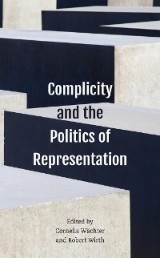Details

Complicity and the Politics of Representation
|
36,99 € |
|
| Verlag: | Rowman & Littlefield International |
| Format: | EPUB |
| Veröffentl.: | 18.03.2019 |
| ISBN/EAN: | 9781786611208 |
| Sprache: | englisch |
| Anzahl Seiten: | 288 |
DRM-geschütztes eBook, Sie benötigen z.B. Adobe Digital Editions und eine Adobe ID zum Lesen.
Beschreibungen
<span><span>This book explores the concept of complicity with regard to the politics of representation. Over the past decades,</span><span> </span><span>complicity critique has evolved and become integral to literary and cultural studies. Nonetheless, the concept of complicity</span><span> </span><span>remains fundamentally underresearched. Addressing topical and exigent concerns such as white supremacy, war and displacement, child abuse and mentalism, this timely volume explores how producers, texts, consumers and critics can either intentionally or unwittingly become complicit in the creation and perpetuation of social harm – and how the structures supporting such complicities can be resisted. The contributors aim to raise awareness and lay the groundwork for a utopian ‘radical unfolding’ that enables not just non-complicity, i.e. the refusal to be complicit, but anti-complicity – the active and collective resistance to social harm.</span></span>
<span>This volume provides an introduction to an important and timely topic, namely the study of complicity and the politics of representation. It elaborates on recent work on complicity and applies recent research on complicity to critical whiteness studies, critical memory studies, critical psychology and psychiatry.</span>
<p><span>1. Introduction: Complicity and the Politics of Representation</span><br><br></p>
<p><span>Cornelia Wächter</span><br><br></p>
<p><span>2. The Chapters</span><br><br></p>
<p><span>Cornelia Wächter and Robert Wirth</span><br><br></p>
<p><span>PART I: NARRATIVE COMPLICITIES AND COLLECTIVE REMEMBERING</span><br><br></p>
<p><span>3. Complicit Configurations: Narrating the Partition of India in Auden, Madhvani and Brenton </span><br><br></p>
<p><span>Christoph Singer</span><br><br></p>
<p><span>4. Complicity on the Small Screen: Ordinary Germans as Perpetrators in Recent German TV Miniseries on World War II and the Holocaust</span><br><br></p>
<p><span>Volker Benkert</span><br><br></p>
<p><span>5. Literary Complicity and the Differend: Naturalizing, Ontologizing, and Self-Referential Representations of National Socialist Persecution</span><br><br></p>
<p><span>Lorraine Markotic</span><br><br></p>
<p><span>6. Guilt and Autonomy in Geoffrey Hill’s and Hermann Broch’s Works </span><br><br></p>
<p><span>Olaf Berwald</span><br><br></p>
<p><span>7. An Illusion of Absence: The Picturesque and Culpable Ignorance in Kazuo Ishiguro’s The Remains of the Day and The Buried Giant</span><br><br></p>
<p><span>Ivan Stacy</span><br><br></p>
<p><span>PART II: ENFOLDINGS AND UNFOLDINGS</span><br><br></p>
<p><span>8. A Radical Unfolding: Utopianism Against Complicity</span><br><br></p>
<p><span>John Storey</span><br><br></p>
<p><span>9. Complicity: Narratives, Articulations and the Politics of Representation</span><br><br></p>
<p><span>Paul Reynolds</span><br><br></p>
<p><span>10. A Murmur of Indifference to Authorial Identity in Intellectual Life</span><br><br></p>
<p><span>Brendan Moran</span><br><br></p>
<p><span>11. I spy with my little eye something complicity simple: Eighteenth-Century Caricature Tricks</span><br><br></p>
<p><span>Mihaela Irimia</span><br><br></p>
<p><span>PART III: NARRATIVE COMPLICITY CRITIQUES</span><br><br></p>
<p><span>12. The Black Counter-Gaze: Complicity and White Privilege in Claudia Rankine’s Citizen </span><br><br></p>
<p><span>Alexandra Hartmann</span><br><br></p>
<p><span>13. Challenging Complicity in the Context of Mentalism: Mental Distress Autobiographies and Performance Art</span><br><br></p>
<p><span>Elisabeth Punzi and Katrin Röder</span><br><br></p>
<p><span>14. Representation of Complicity with Child Sexual Abuse in the Movies: Spotlight and Doubt</span><br><br></p>
<p><span>Eli Teram</span><br><br></p>
<p><span>15. “...to understand everything that came her way”: Complicity and the Child Protagonist </span><br><br></p>
<p><span>Elizabeth Gilbert</span><br><br></p>
<p><span>Works Cited</span><br><br></p>
<p><span>Index</span><br><br></p>
<p><span>About the Contributors</span></p>
<p><span>Cornelia Wächter</span><br><br></p>
<p><span>2. The Chapters</span><br><br></p>
<p><span>Cornelia Wächter and Robert Wirth</span><br><br></p>
<p><span>PART I: NARRATIVE COMPLICITIES AND COLLECTIVE REMEMBERING</span><br><br></p>
<p><span>3. Complicit Configurations: Narrating the Partition of India in Auden, Madhvani and Brenton </span><br><br></p>
<p><span>Christoph Singer</span><br><br></p>
<p><span>4. Complicity on the Small Screen: Ordinary Germans as Perpetrators in Recent German TV Miniseries on World War II and the Holocaust</span><br><br></p>
<p><span>Volker Benkert</span><br><br></p>
<p><span>5. Literary Complicity and the Differend: Naturalizing, Ontologizing, and Self-Referential Representations of National Socialist Persecution</span><br><br></p>
<p><span>Lorraine Markotic</span><br><br></p>
<p><span>6. Guilt and Autonomy in Geoffrey Hill’s and Hermann Broch’s Works </span><br><br></p>
<p><span>Olaf Berwald</span><br><br></p>
<p><span>7. An Illusion of Absence: The Picturesque and Culpable Ignorance in Kazuo Ishiguro’s The Remains of the Day and The Buried Giant</span><br><br></p>
<p><span>Ivan Stacy</span><br><br></p>
<p><span>PART II: ENFOLDINGS AND UNFOLDINGS</span><br><br></p>
<p><span>8. A Radical Unfolding: Utopianism Against Complicity</span><br><br></p>
<p><span>John Storey</span><br><br></p>
<p><span>9. Complicity: Narratives, Articulations and the Politics of Representation</span><br><br></p>
<p><span>Paul Reynolds</span><br><br></p>
<p><span>10. A Murmur of Indifference to Authorial Identity in Intellectual Life</span><br><br></p>
<p><span>Brendan Moran</span><br><br></p>
<p><span>11. I spy with my little eye something complicity simple: Eighteenth-Century Caricature Tricks</span><br><br></p>
<p><span>Mihaela Irimia</span><br><br></p>
<p><span>PART III: NARRATIVE COMPLICITY CRITIQUES</span><br><br></p>
<p><span>12. The Black Counter-Gaze: Complicity and White Privilege in Claudia Rankine’s Citizen </span><br><br></p>
<p><span>Alexandra Hartmann</span><br><br></p>
<p><span>13. Challenging Complicity in the Context of Mentalism: Mental Distress Autobiographies and Performance Art</span><br><br></p>
<p><span>Elisabeth Punzi and Katrin Röder</span><br><br></p>
<p><span>14. Representation of Complicity with Child Sexual Abuse in the Movies: Spotlight and Doubt</span><br><br></p>
<p><span>Eli Teram</span><br><br></p>
<p><span>15. “...to understand everything that came her way”: Complicity and the Child Protagonist </span><br><br></p>
<p><span>Elizabeth Gilbert</span><br><br></p>
<p><span>Works Cited</span><br><br></p>
<p><span>Index</span><br><br></p>
<p><span>About the Contributors</span></p>
<span>Cornelia Wächter is Assistant Professor of British Cultural Studies at the Ruhr University Bochum, Germany. She is the author of Place-ing the Prison Officer: The ‘Warder’ in the British Literary and Cultural Imagination (Brill, 2015) and co-edited Middlebrow and Gender, 1890-1945 (Brill, 2016) with Christoph Ehland.<br><br>Robert Wirth is a Research Assistant in the Department of English and American Studies at the University of Paderborn, Germany, lecturing in English Language and British Cultural and Literary Studies. <br><br></span>
Diese Produkte könnten Sie auch interessieren:

Ethik in der Medizin. Abwägung von Risiko und Nutzen bei experimentellen Behandlungen

von: Mercan Karadag

5,99 €
















